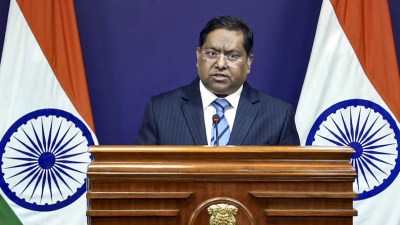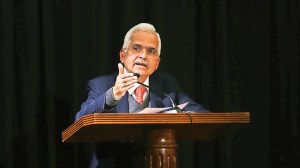Wisdom at the barricades
This is the time to sustain good reformist economics,on the crutches of smart populism
Barack Obama,the charming,charismatic and celebrity president of the United States,is going to experience something very different from what he is used to when he arrives in London for the G-20 summit. The man used to large crowds of adoring and passionate supporters is going to drive past one doubts if the Secret Service will allow him to risk facing them crowds of very angry people. Ironically enough,most of these very people would have been his ardent supporters,or sympathisers at the very least,when he campaigned in a somewhat populist tradition for change on an anti-establishment platform. Two months is all that its taken for Obama to be distrusted too such is the magnitude of the global economic crisis which faces almost everyone.
For the protesters as well,this time will be qualitatively different from previous demonstrations. This may sound odd after all these groups have been pretty regular sideshows at various G-8,G-20,WTO,World Bank and IMF summits ever since the massive protest at the WTOs Seattle meeting in 1999. They are still an incredibly motley group anarchists,environmentalists,trade unionists,Oxfam even those who object to a third runway at Londons Heathrow airport! So,whats really different about them?
This time the populist protesters no longer seem to be the sideshow,primarily because they reflect and are expressing vociferously the deep anger of a much broader section of global society than hitherto. The anger,at its base,is about the consequences of the economic crisis. But it is,in particular,directed at those in the world of finance and banking who people at large view as responsible for bringing on this crisis. What makes the anger worse is the perception that the culprits in finance are getting a landing soft when compared with many others who are suffering much more. Its no surprise then that the protesters have amusingly anointed April 1,2009 as financial fools day.
The mainstreaming of the populist protesters is also reflected in the fact that,for once,politicians are attempting to reach out to them. Until the unravelling of this crisis,these were groups which could be physically barricaded away from major summits and intellectually dwarfed by the very obvious success of the system they were protesting against. After all,free markets and globalisation lifted hundreds of millions of people out of poverty largely because of the phenomenal growth not only of China and India but also in places like Africa and Latin America and made others wealthier than they were under the more closed world between 1945 and 1980.
The change can be gauged from the fact that leaders as powerful as Joe Biden and Peter Mandelson tried to make appeals for patience directly to the people on the streets. Interestingly their appeal was directed to a rainbow group of protesters including NGOs and trade unions under the banner of Put People First who are drawing attention to poverty,jobs and climate change all fairly mainstream concerns unlike,say,anarchy.
Whether the G-20 summit achieves anything concrete or not,events around it clearly show the way the balance of global political economy is swinging leftwards. Given the scale of the crisis and its root causes in financial capitalism this shift is inevitable. Free markets,after all,do not exist in a vacuum they need popular legitimacy,something which voters in at least the US and the UK had been granting them since the Reagan-Thatcher revolution. Now,politicians need to manoeuvre around to a new political consensus and social contract.
In doing so,they still must be wary about the agenda of the varied populists they want to bring on board. The edifice of free market capitalism and globalisation is after all about much more than just global high finance think free trade,foreign direct investment,movement of people across borders,to name a few. And the problem is that the populists would instinctively turn the entire system on its head,which would send the global economy into an even sharper tailspin.
So,whats the compromise politicians must strike? First,there will have to be some redistribution given the severity of the downturn and the toll its taking on the poorest. This should,however,be done in the least distortionary way. Textbooks would suggest lump-sum cash transfers as opposed to protectionism or nationalisation which is precisely the policy road the US and UK governments are already taking. It is politically difficult to argue about the costs of redistributing to the poor when billions and trillion are being pumped into banks and financial institutions.
In this there is a lesson for India. For too long we have resorted to distortionary and ineffective ways to allegedly protect jobs and create livelihoods protectionism,licence raj,big public sector,etc,which achieved little. Nows the time for policymakers to push more effective direct transfer programmes to the poorest while stepping up reform in other areas including disinvestment to help finance this transfer spending without busting the deficit a combination of good reformist economics on the crutches of some minor but effective populism.
At the global level,politicians have begun responding to some populist/public concerns. Already,tax havens are being forced to become more transparent. Thats a good thing. A debate on the future regulation of finance has also begun. It need not,of course,shut off finance as we have known it,but it can help make the system a lot more transparent and a lot less prone to opacity,collapse and crisis. This crisis has been in large part caused by the opacity of securitised assets if perhaps the pricing of these assets was transparent we might have got out of the mess sooner.
But thats where the adjustment with populism must end. There ought not to be any compromise on free trade or on the free movement of capital across borders once confidence returns. In India,policymakers may feel emboldened to undertake more pro-poor public spending after all thats mainstream and hardly populist now. But they should also press ahead with other reforms,like disinvestment which can help finance their spending plans. And lets not even contemplate raising barriers to foreign trade and foreign capital anyone who lived through Indias decades of socialism would know the dangers of populism in that form.
dhiraj.nayyarexpressindia.com
- 01
- 02
- 03
- 04
- 05































